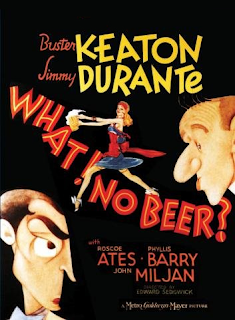Directed by Edward Sedgwick
Written by Robert E. Hopkins (story), Carey Wilson (screenplay), Jack Cluett (Additional dialog)
Starring Buster Keaton, Jimmy Durante, Phyllis Barry, Edward Brophy
IMDB Entry
Buster Keaton's last film for MGM (and his last American starring feature) was another teaming with Jimmy Durante, What No Beer?
Elmer J. Butts (Keaton) is a taxidermist who falls for Hortense (Phyllis Barry). His best friend, Jimmy Potts (Durante), is an avid "wet" -- favoring the end to Prohibition. After repeal, Jimmy gets the idea to make beer and cash in. Elmer puts up the money (hidden in various animals in his shop) to buy a brewery and start brewing. They manage to make a batch, and are raided, but it turns out the beer they were selling has no alcohol content. Released by the authorities, they go into making "near beer" -- without alcohol -- when they discover one of their workers was a brewmaster in St. Louis with that as his specialty. Elmer wants to money to woo Hortense, and the gangster Spike Moran (Edward Brophy) gives them cash -- and secretly has them brew real beer, so Elmer and Jimmy will be the fall guys if they're raided.
Like Keaton's other films with Durante, this is a pleasant and forgettable comedy. But Keaton was on the downswing. Frustrated by his deteriorating personal life and divorce, his lack of input in his movies, and his orders not to do any dangerous physical gags, he turned to drink. Indeed, he appears to be drunk in several scenes. Stunt men handled the physical comedy (except for pratfalls) and Keaton would not show up for shooting some days.
Durante plays Durante. He was not someone who could play any character but himself, but he's good enough to fit in. In this film, he's billed with Keaton above the title, though Keaton's name is on the left.
The movie did well enough to create talk of another teaming. But Keaton's alcoholism reduced MGM's faith in him, and when he did something to piss off Louis B. Mayer (accounts vary), he was fired. It was the low point of his life. He kicked the alcohol and was eventually hired by Educational Pictures* for a series of short comedies. He also made a living as a gag writer, eventually working his way into supporting roles. He shows up in Sunset Boulevard as one of the Hollywood "waxworks," a comment that he was washed up.
But Keaton was a shell of himself. His age made it harder to do physical comedy. He had some success in television.** Eventually, a biopic was made of his life starring Donald O'Connor. It bore no resemblance to his actual life, but the money allowed him to buy a house where he lived the rest of his life.
____________________________________________________________________
*A misleading name. Founded to make actual educational films, it switched to two-reel comedies with sound, often starring established comedians who had been dropped by a major studio. As a footnote, I have a film guide in French that says that Roscoe "Fatty" Arbuckle did "films éducatifs." Given his reputation after the scandals, the idea that he did lower-case "educational films" is highly absurd.
**Including a Twilight Zone episode "Once Upon a Time," with Keaton as a time traveler. It was one of the few times that he was allowed free reign to do the kind of gags he did back in the silent days (much of the show is shot silent and in black and white); writer Richard Matheson made it an homage to Keaton's greatness and director Norman Z. Mcleod had helmed movies with the Marx Brothers and W.C. Fields, so he understood comedy. It is one of the most entertaining episodes of the show.



